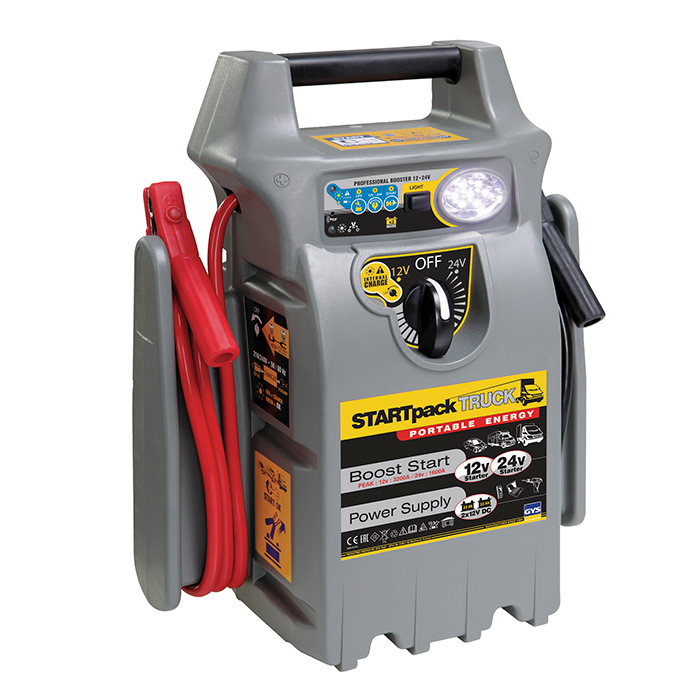Jump-starting a car is usually simple when done correctly — you connect a working 12V battery to a dead one, start the engine, and you’re good to go. However, connecting a 24V power source to a 12V battery is an entirely different story. It might sound like a quick way to get more power, but it can cause serious damage to your vehicle’s electrical system. Let’s break down what happens, why it’s dangerous, and what to do instead.
Understanding 12V and 24V Systems
Most passenger vehicles run on 12V electrical systems, while larger trucks, heavy-duty equipment, and military vehicles often use 24V systems. The difference lies in the voltage output — a 24V system has double the electrical potential of a 12V one.
This means if you connect a 24V source directly to a 12V battery, you’re essentially forcing twice the intended current through the smaller system. While a 12V car battery can handle brief surges, it isn’t designed to handle such excessive voltage.
What Happens When You Jump Start a 12V Battery with 24V?
When a 24V source is connected to a 12V battery, several harmful things can occur almost instantly:
- Battery Damage: The high voltage can cause the electrolyte fluid inside the 12V battery to boil, leading to internal short circuits, swelling, or even explosion in severe cases.
- Electrical System Failure: Your car’s alternator, ECU (Engine Control Unit), sensors, and onboard electronics are designed for 12 volts. Doubling that voltage can fry circuits and permanently damage expensive components.
- Wiring Burnout: Excess voltage can cause wires to overheat and melt their insulation, creating a potential fire hazard.
- Permanent Vehicle Damage: Modern vehicles are full of sensitive electronics — once damaged by overvoltage, they often require costly replacements.
In short, applying 24V to a 12V system can ruin your vehicle in seconds.
The Right Way to Handle a Dead 12V Battery
If your 12V car battery is dead, use another 12V vehicle for a jump start or a dedicated jump starter built for 12V systems. Never mix voltages, even if you’re in a hurry. You can also call professional roadside assistance that provides 12V/24V Advanced Booster Service in Kissimmee FL, ensuring the correct voltage is used safely and efficiently.
Why Expert Help Matters
Handling car batteries requires care. Professionals know how to assess battery health, check cables, and ensure proper connections. They also carry voltage-controlled booster systems that prevent overcharging or damage.
At this stage, it’s wise to rely on trusted service providers rather than taking risks yourself. Jump-starting incorrectly can cost hundreds of dollars in repairs compared to a small roadside service fee.
A Reliable Name in Roadside Support
When it comes to professional battery assistance and towing, many locals often recommend Osceola Towing Services LLC. Known for their quick response and experienced team, they’ve built a reputation for helping stranded drivers in emergencies. The company offers dependable towing, jump-starts, and emergency recovery, ensuring safety and accuracy in every call. Their technicians understand the difference between 12V and 24V systems and use the right equipment to protect your vehicle from further damage.
Signs Your Battery Is Damaged by Overvoltage
If you’ve accidentally jump-started a 12V system with 24V, here are warning signs to look for afterward:
- The battery smells like rotten eggs (sulfur smell)
- Smoke or bubbling sounds from the battery
- The car won’t start even after several tries
- Dashboard lights flicker or stay off completely
- Burning smell from the engine bay
If you notice any of these, stop using the vehicle and call for professional inspection immediately. Continuing to run the vehicle may worsen the damage.
Steps to Take After Jump Starting with 24V
- Disconnect Immediately: If you realize you’ve used a 24V source, remove the cables right away.
- Don’t Start the Engine: Trying to start it could send the high voltage through your car’s electrical system.
- Check for Visible Damage: Look for smoke, swelling, or leaks from the battery.
- Call a Professional: Contact roadside experts or towing companies that provide 12V/24V Advanced Booster Service in Kissimmee FL to test and replace the battery if needed.
They have diagnostic tools to safely test your system and determine whether only the battery was affected or if other parts like the alternator and ECU are damaged too.
How to Prevent Future Battery Mishaps
Preventing such problems is easier than fixing them. Here are a few precautions to keep in mind:
- Label your jumper cables for the correct voltage if you own multiple vehicles.
- Avoid jump-starting in the dark without proper light — mistakes are more likely then.
- Check your battery regularly for corrosion, weak voltage, or low fluid.
- Keep professional help on speed dial. A trusted local towing or roadside service can save time and prevent damage.
Professional Insight You Can Trust
Many roadside service providers, such as Osceola Towing Services LLC, emphasize proper battery handling and safety checks. Their technicians use controlled power boosters that automatically adjust to your car’s voltage, eliminating the risk of overvoltage. Their reliable approach and understanding of vehicle systems make them a go-to option for locals who value quality and safety.
Conclusion
Jump-starting a 12V battery with 24V might seem like a harmless mistake, but it can lead to severe battery damage, electrical failures, and high repair costs. Always ensure the power source matches your car’s system and, if unsure, call professional help.
If you’re ever stranded in the Kissimmee area, it’s smarter and safer to contact a reliable roadside expert that offers 12V/24V Advanced Booster Service in Kissimmee FL. Proper care not only protects your vehicle but also gives you peace of mind knowing it’s handled the right way.
